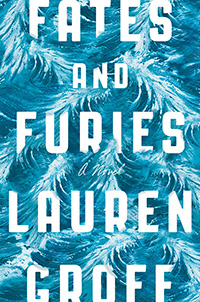
Book Club
Lauren Groff
Tuesday, Nov. 1
Synopsis
A literary masterpiece that defies expectation and a dazzling examination of a marriage. It is also a portrait of creative partnership written by one of the best writers of her generation.
Every story has two sides. Every relationship has two perspectives. And sometimes, it turns out, the key to a great marriage is not its truths but its secrets.
At the core of this rich, expansive, layered novel, Lauren Groff presents the story of one such marriage over the course of twenty-four years.
At age twenty-two, Lotto and Mathilde are tall, glamorous, madly in love, and destined for greatness. A decade later, their marriage is still the envy of their friends, but with an electric thrill we understand that things are even more complicated and remarkable than they have seemed.
With stunning revelations and multiple threads, and in prose that is vibrantly alive and original, Groff delivers a deeply satisfying novel about love, art, creativity, and power that is unlike anything that has come before it. Profound, surprising, propulsive, and emotionally riveting, it stirs both the mind and the heart. (From the publisher.)
Reading Group Discussion Questions
1. Fates and Furies is told in halves. Why do you think the author chose to narrate the story this way? How did the split storytelling affect your reading of the book? Might it be symbolic of the characters’ inner lives?
2. Consider Mathilde’s final decision—to keep her past a secret for so many years. Do you think she should have told Lotto the truth? Think about whether this lie was truly for the best; could they have been happy if Mathilde had told him everything? Why do you think she kept this information to herself?
3. How did the inclusion of Lotto’s writing affect your reading experience? Did Lotto’s plays help you to understand his character?
4. Discuss the way the author presents Lotto’s writing talent. Mathilde has a significant hand in his success, but she is never recognized for it. Should she have taken the credit? Discuss the effect of stardom on Lotto’s understanding of himself and his marriage.
5. Fates and Furies questions male vs. female perceptions of reality. Think about how the author approaches the notion of feminine anger. Mathilde is an incredibly angry character; do the men in her life allow for this anger? Why or why not? Do you think Lotto is a misogynist? And how does your vision of Lotto’s world change after hearing Mathilde’s side of the story?
6. Mathilde’s relationship with Ariel is abusive. What does Ariel’s presence in the story say about Mathilde’s natural impulse toward revenge? Where is her reaction to her experience with Ariel directed at other characters?
7. Think about setting. As the characters grow, they find themselves in ever-changing spaces. How does each setting compel their actions and, eventually, their relationships? Specifically, discuss Mathilde’s life in France, Lotto’s childhood in Florida, and how these geographical differences affect their union in New York.
8. Fates and Furies spans a long period of time. Chronologically, the plot is very complex, though there is a central focus on Lotto and Mathilde. . How do Lotto and Mathilde change over the years, together and apart? Do you think they had a happy marriage?
(Questions provided by the publisher)
Additional Discussion Questions for Consideration
1. Why is Lancelot connected with the “Fate” chapter? How would you describe his personality—do you consider him passive, optimistic (unreasonably so?), fair-minded and accepting? Is he humble or, maybe, egotistical?
2. Follow-up to Question 1: We’re told that his parents and aunt, early on, believed Lotto was destined for greatness: “It was taken for granted by this trio of adults that Lotto was special. Golden.” What effect does this expectation have on his life? What effect does any such expectation have on anyone’s life?
3. What about Mathilde? How would you describe her as a character? In what way is she different from, perhaps even the opposite of, Lotto?
4. Follow-up to Question 3: How do Mathilde’s early years—in particular, its tragedy—shape the path of her life? Is fate to blame for her ruthlessness? If so, why is she associated with the “Furies” chapter rather than the “Fates” chapter?
5. In what way does the early tragedy in Lotto’s life draw him to Mathilde? And vice versa—what attracts Mathilde to Lotto? How would you describe the early stages of their love and marriage? Are cracks visible at the beginning…or is all smoothness and perfection?
6. Why does Lauren Groff structure her book the way she does: two separate chapters told by two different characters? Why might she have started off with Lotto’s account before Mathilde’s? What difference would it have made if she had placed Lotto’s after Mathilde’s? What exactly gets revealed in Mathilde’s telling, and were you surprised?
7. Clearly, this book is about a marriage. But the author tackles far broader issues—one of which was addressed in earlier questions (#2 and 4): to what extent do early experiences shape character and life events? Another question Groff examines is what really constitutes such things as “good fortune”? A third question has to do with the extent to which we can truly understand our own life or the life of someone close to us. Tangentially, is it possible to truly know another being? Do you want to weigh in on any of those issues? For starters, how does the novel pose those questions?
8. Talk about the author’s use of wordplay, starting with, say, the name Lotto…and even Lancelot. Where else do you find words with double meanings?
9. How much do you know about classical mythology, especially the Fates and the Furies? Who are they in Greek mythology? Where else in the novel does Groff rely on mythology? Notice, for instance, the narrative interruptions, the unnamed voice who interjects and comments. How do those interjections resemble a Greek chorus—and why use such a narrative technique?
10. Are you able to pinpoint other literary allusions—say, to Shakespeare?
11. In what way are readers deliberately misled in this story—and why? Did you feel somewhat manipulated? Or is that the point of Groff’s writing?
(Questions by LitLovers)
Additional Book Club Resources
Other Works by Lauren Groff
Novels and collections
• The Monsters of Templeton, a novel (2008)
• Delicate Edible Birds (2009)
• Arcadia (2012)
• Fates and Furies (2015)
Short stories
• “L. Debard and Aliette” in The Atlantic Monthly
• “Lucky Chow Fun” in Ploughshares
• “The Ballad of Sad Ophine” in Hobart
• “Elaborate” in Washington Square
• “Delicate Edible Birds” in Glimmer Train
• “Above and Below” in The New Yorker
• “Amaranth” in Lucky Peach
• “Ghosts and Empties” in The New Yorker
If You Liked The World According to Garp, may we recommend …
The Woman Upstairs, Claire Messud
Life Drawing, Robin Black
I Want to Show You More, Jamie Quatro
The Marriage Plot, Jeffrey Eugenides
The Forgotten Waltz, Anne Enright
Shadow Tag, Louise Erdrich
Did You Ever Have a Family, Bill Clegg
Mrs. Bridge and Mr. Bridge, Evan S. Connell
The Expats, Chris Pavone
The Man in the Wooden Hat, Jane Gardam
Middlemarch, George Eliot

